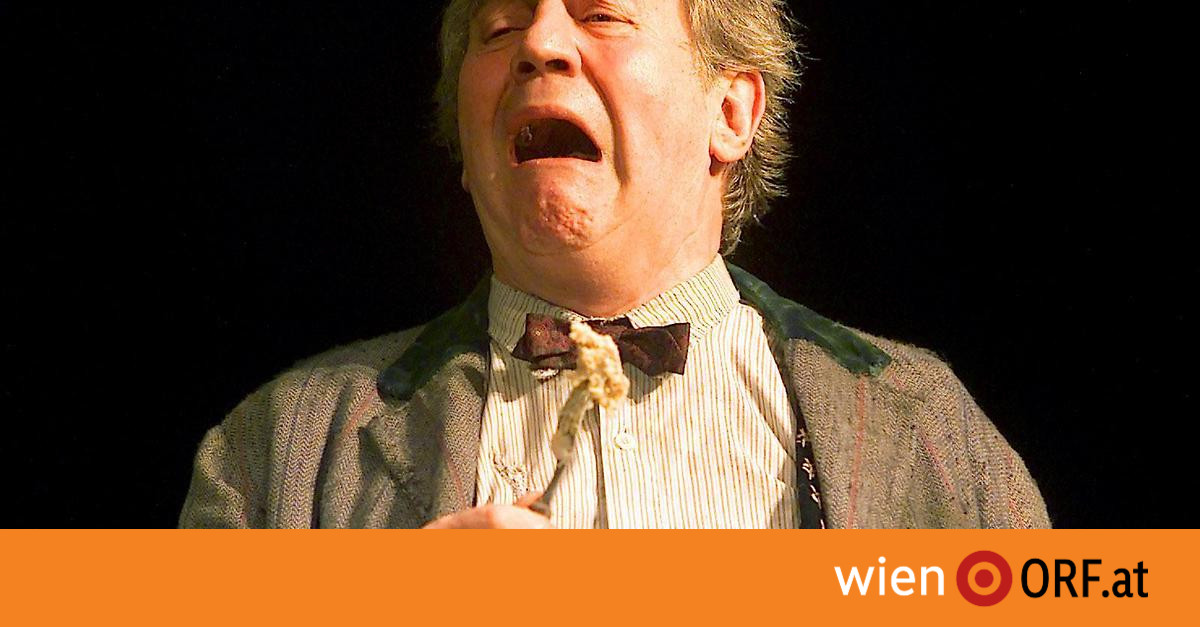more on the subject
Otto Schenk’s Complete Works (extract)
–
The old valet Firs in Amelie Niermeyer’s unconventional Chekhov staging is perhaps the last major role of the Josefstadt-Doyen in the theater, which he directed from 1988 to 1997. As a relic of bygone times, he is mistakenly lost again and again due to the hectic activity on stage, a ghost that is about to dematerialize. Corona-related, however, the festival performance of “The Cherry Orchard” including celebration in the theater in Josefstadt has been canceled. Josefstadt director Herbert Föttinger has promised to resume the production in September.
Debut as a gendarme in the Theater der Jugend
Otto Schenk was born on June 12, 1930 in Vienna, the son of a notary and a salesperson and manager from Trieste. He made his stage debut in 1947 as a gendarme in Karl Schönherr’s “Karrnerleut” at the Theater der Jugend, which was then housed in Urania. During the audition at the Max Reinhardt Seminar as a piece of paper, he convinced i.a. the great Helene Thimig. During this time he also took over the Parkring Theater with a group of like-minded theater enthusiasts and was a great success with Erich Neuberg’s production of Beckett’s “Waiting for Godot”.
In 1996, Salzburg’s Mayor Josef Dechant awarded Otto Schenk (center) and Helmut Lohner (center) the ring of honor of the city of Salzburg.
From the cellar theaters in the mid-50s he switched to the theater in Josefstadt via the Volkstheater. He celebrated his breakthrough as a director in 1960 with his Josefstadt production of Eugene O’Neill’s “O Wildnis!”. This was followed by Horváth productions at the Munich Kammerspiele (“Stories from the Vienna Forest”, 1966), directorial work at the Deutsches Schauspielhaus in Hamburg, at the Salzburg Festival – among others. Shakespeare’s “What You Want” (1972) and “Der Zerrissene” (1982, with himself as a hammer) – and at the castle. He only made his acting debut at the Burgtheater in 1996 when he was old in Raimund’s magic fairy tale “The Farmer as a Millionaire”.
Otto Schenk, 1995 –
World career as an opera director
“I am a heavy, sluggish millstone, and there have always been people who have moved this mill wheel,” Schenk once flirted with his own indolence, which could not be so bad when he looks back at around 170 productions that he has created over the course of his long career. He even had a world career as an opera director. It led him from the Salzburg State Theater to the State Opera and the Salzburg Festival to the New York Met. There Schenk made his debut in 1970 with “Fidelio” and in 2009 brought his “Ring des Nibelungen” (1986-88) on stage again.
At the Met, his second home, he also broke his oath to finally withdraw from directing in 2006 to work with Anna Netrebko and directed Donizetti’s “Don Pasquale”. In Vienna, the new State Opera Director Bodgan Roscic keeps the legendary “Rosenkavalier” production by Schenk from 1968 in the repertoire and only refreshes it musically.
Convincing on stage and in front of the camera
Schenk played the “Bockerer” on stage (1984 in the Munich Volkstheater and 1993 in Josefstadt), convinced as Fortunatus Wurzel in “The Farmer as a Millionaire” (Salzburg Festival, 1987), as “Volpone” (1989), as Salieri in Shaffer’s “Amadeus” (1991), as a magical king in “Stories from the Vienna Forest” (1994), as Moliere’s “The Miser” (1995), as Rappelkopf in Raimund’s “The Alpine King and the Misanthrope” (Salzburg Festival, 1996) , in Turrini’s “Josef and Maria” (1999) or as Thomas Bernhard’s “Theatermacher” (2006).
In 1997 Otto Schenk received the honor ring of the city of Vienna from the then mayor Michael Häupl. Schenk owes his popularity in Austria, who has been married to his wife Renée since 1956 and has a son with her (the conductor Konstantin, born 1957), but also due to his lively screen presence and his numerous readings and solo evenings, which follow the current one Corona mandatory break will not be continued until autumn. With cabinet pieces such as “Die Sternstunde des Josef Bieder” (since 1992) or “Othello may not burst” (from 1990), he inscribed himself primarily as a comedian in the collective memory .
Photo gallery with 5 pictures
“Fear of death? – Ask me later! “
Otto “Otti” Schenk is a chamber actor as well as an honorary member of the Vienna State Opera and Theater in Josefstadt, and in the 80s he also became “Citizen of Vienna”. “The art of making people laugh is given to Otto Schenk like no other. But because this laugh is connected with the secret recognition of human fallibility, people love it, ”said 2000 in the reason for the life’s work“ Nestroy ”. “Otto Schenk helps them to dissolve their fears for a moment when they laugh. And comfort them with their own misfortunes and weaknesses. That’s how he became Austria’s most popular actor. “
“It was not always funny,” he called a memory book, “I was never out for it to be funny. I was looking for people to believe me. ”Another book about Otto Schenk was published for his birthday. “Schenk – The Book” uses many photos by Michael Horowitz to draw “an intimate picture of life”, as the subtitle states. Schenk comes out in the book as “man-eater” and closes with a look at the inevitably coming life finale: “If I were asked if I was afraid of death, I would answer: Ask me later!”
–
Related
